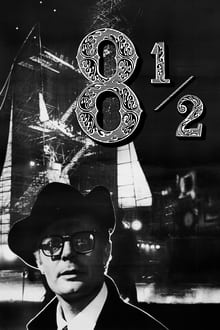
Fellini, deconstructed, improvised and enshrined in a film that (not) pleases everyone.
I'm not a fan or deep connoisseur of Italian cinema, but I've heard of Federico Fellini, and I know that this film is considered one of this director's best films. I haven't seen any of his films yet: this was the first. And honestly, I don't quite understand this fascination: the film is chaotic! I think that, unless someone is an expert in cinema, the vast majority of people who saw the film did not understand it, but then said that it was very good just to avoid being criticized. I'm glad I don't give a damn what other people think of me...
Fellini was out of great ideas, and the production started working without even having an idea of what the director was going to do. Not even he knew! He was about to give up when the light came: to make a somewhat autobiographical film about a filmmaker in crisis, who had to make a film due to studio commitments, but didn't know what film he wanted to make. Let's face it: it was an excellent idea, even if it resulted in a film that is too complicated and disjointed. Over the course of more than two hours, we see scenes and situations in which the director reflected a lot about himself in the main character: the complicated issues with a restrictive and judgmental Catholic faith, strong moral conflicts, a rebellious childhood, the omnipresence of impactful female figures (the mother, the wife, the objects of desire)… everything is composed as a delirium of a filmmaker empty of ideas. For the time, this was quite innovative, but looking closely today, it doesn't make much sense and is more tiring than interesting.
Technically, the film is excellent. The soundtrack, by Nino Rota, is quite atmospheric; the cinematography, with the framing, the differences in shot and sharpness, is an authentic lesson taught by a master. The choice of filming locations and sets is careful. Marcello Mastroianni and Claudia Cardinale are the most notable actors in the film, but they both have better works and I don't feel that this film is worth seeing because of them. But what really tired me was the artificiality of the dubbed dialogues: Fellini liked to film with noise (he's like that college students who like to study in crowded cafeterias), and the actors often improvised their lines over a sketch that was given at this moment, so all the dialogues were dubbed and arranged in post-production. The result is surreally strange and fake, with the movement of the mouth not matching what we are hearing.
Yes, this is one of the great works of Italian cinema, that's for sure, and when we see these points analyzed we can understand it better. But it is not the type of film that the general public wants to see, and it ended up being left to an intellectualist and hermetic elite, who like to treat cinema as their thing, with an almost mystical sort of knowledge that cannot be passed on to any mortal. I don't care about that, or what anyone calls me: films like that are good for sleeping.